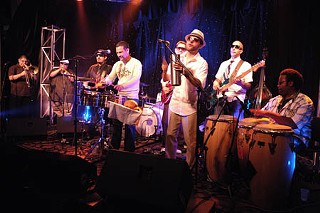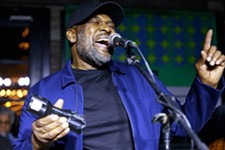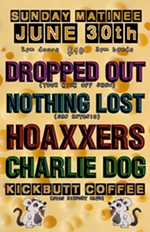Salsa, Cumbia, Merengue, Everything
Grupo Fantasma's many heads (and arms, legs, saxophones, trumpets, trombones ...)
By Thomas Fawcett, Fri., June 13, 2008
Atop the biggest stage on the biggest night of the biggest festival, the JewMex horns surveyed a sea of more than 50,000 in the desert night, stole a glance at one another, and uttered a single syllable: "Damn!"
"The minute we walked out of our trailer and into the field behind the stage, it sounded crazy big-stadium loud," marvels Gilbert Elorreaga, whose extra-large frame dwarfs his tiny trumpet. "We knew it was gonna be vicious."
"A phenomenal amount of people," adds Josh Levy, who plays baritone sax. "It looked like an ocean, a human ocean."
Elorreaga, Levy, Leo Gauna, and Gene Centeno – the brass behind Austin 10-piece Grupo Fantasma – huffed and puffed a medley of Carlos Santana, the California king of the festival circuit. From the primal roar of "Jungle Strut" to the bloodletting of "Soul Sacrifice," the mob's appetite was insatiable. Shimmering on the 2008 Coachella altar in front of them, attired in a sequined white tunic, axe in hand, stood Prince.
Puff Daddy
November 2006, Grupo Fantasma gets an early-morning wake-up call: "Can you be ready in three hours? Prince needs you in L.A. right away for the Golden Globes afterparty."
Cramped behind gear in a corner of the top-floor presidential suite at the Beverly Wilshire Hotel that same day, the band discovered they weren't opening for Prince. They were his band. There were only two problems with that.
"We'd never actually interacted with him, and we only knew, like, three of his songs," laughs Adrian Quesada, Grupo's guitarist, producer, and de facto leader. "Needless to say, we were really nervous."
"'Just play your music,'" Quesada recalls the Purple One assuring. "'Don't worry about me; I'll just play guitar.'"
Quesada cased the suite with Grupo guitar comrade Beto Martinez to calm their nerves. "People were just starting to come in," he says. "The first person we saw was Puff Daddy."
Somehow, the local boys convinced themselves they weren't out of their league but rather in their element. This was nothing more than a glorified house party with an exclusive guest list. Soon, those Hollywood A-listers would learn what many Austinites have tattooed on their ears: Grupo turns the party out with a grinning mix of salsa, funk, and psychedelic cumbia.
Talib Kweli and Will.i.am rapped over Grupo's funky break beats, Mary J. Blige sang a soulful set to the band's smoother grooves, and Marc Anthony played the role of velvet-voiced cantante Hector Lavoe on classic hard salsa "La Murga." All the while, His Purple Majesty added blistering guitar solos and Jennifer Lopez shook her posterior front and center. At the height of madness, Cuba Gooding Jr. climbed up a speaker cabinet, screaming his approval.
King Tubby
"If you go to downtown Laredo, everyone's speaking Spanish," relates Beto Martinez of his hometown. "It looks just like Mexico, and then the bridge is right there."
That span connects Laredo and Nuevo Laredo, which share a single culture if not a national allegiance. Nearly everyone has family in el otro lado. For Martinez, there was one important difference: Any underage kid knows bartenders in Nuevo Laredo will serve them.
"We were still in high school when we started to go across the river to party. You could drink, hang out, and get into all different kinds of stuff. We would go to these bars and there would be these cumbia bands playing – live, raunchy stuff with accordion, guiro, congas, and bass. Real dirty and raw."
Seven members of Grupo Fantasma grew up in Texas border towns – five in Laredo – and when the band formed locally in 2000, it was that seedy border-dive cumbia they aimed to replicate.
Born from the merger of two Austin acts, Grupo came rough and ready: The Blue Noise Band included Quesada, former Grupo saxophonist and current manager David Lobel, drummer Jeremy Bruch of What Made Milwaukee Famous, and bassist Tom Benton. The Blimp, meanwhile, featured Laredo natives and current Grupo members Martinez, bassist Greg Gonzalez, drummer Johnny Lopez, and former Grupo singer Brian Ramos. The Blimp sailed from Laredo and crashed into Quesada in Austin. The newly formed Grupo earned a reputation for funk-infused cumbia marathons but still lacked the chops for other Afro-Latin music.
"It wasn't until Jose Galeano came into the band that we learned to play salsa," Martinez confesses. "He came in and said: 'What are you guys doing? You can play cumbia, but your salsa is weak.' So he schooled us on some stuff, and we learned how to play salsa and not just our own ridiculous version of salsa."
Singer and timbalero Galeano, 44, grew up in Managua, Nicaragua, and moved to Austin for school in 1988. He gigged with several Austin bands before boarding Grupo in 2001, following the release of the band's eponymous debut. Of the band, Galeano's roots are most intertwined with the clave, the basic rhythmic pattern behind nearly all Afro-Latin music. His uncle, Jose "Chepito" Areas, tapped timbales in the original Santana band and graces the Rock & Roll Hall of Fame.
"My uncle put the Latin in rock with Santana," Galeano boasts. "He was responsible for adding that flavor, and he's been the great influence in my musical life. I grew up watching him, listening to him, and wanting to be like him. To see him come home after a huge tour with Santana in the early 1970s was a huge event."
With the help of Galeano, Grupo Fantasma morphed from a freaky cumbia party band to a full-fledged Latin orchestra. The results manifest in the sweeping scope of Sonidos Gold, the band's fourth LP and third studio album. The song cycle explodes with the brass-driven "El Sabio Soy Yo," revs to the wah-wah overdrive of Irakere's "Bacalao Con Pan," and transforms traditional "Cumbia de los Pajaritos" into an echo chamber the envy of King Tubby.
"We've been able to take Latin music in many different directions and keep it modern at the same time," Galeano explains. "It's old-school ideas, but we bring a modern backbeat. When you mix those things together – boom! – you have the Grupo Fantasma sound."
Maceo Parker
On the eve of a nationwide summer tour, Grupo Fantasma bids Austin farewell with a raucous CD release party at Mohawk. Amidst the cumbias, salsas, merengues, rumbas, y guaguancos, the low rumble of Josh Levy's baritone sax cuts loose a nasty midtempo funk groove. It's the opening of "Gimme Some," a monstrous funk burner from Sonidos Gold that features local soul-shouter Black Joe Lewis and a scorching solo from sax legend Maceo Parker of James Brown fame.
"This isn't a unique idea," Quesada explains later. "South Texas Tejano groups like Ruben Ramos, Latin Breed, and Little Joe liked Motown and R&B, and every album they did in the 1970s would have a standout funk jam. It's cool to know we're in a long line of people who did that. We're very proud of the South Texas thing."
Latin Breed, whose longtime trumpeter Gilbert "Beto" Elorreaga taught his son and Grupo trumpet player how to pucker, has been synonymous with the San Antonio Tejano scene for nearly four decades. Funk aficionados know the group for rarities such as blistering Isley Brothers cover "I Turn You On." Also from the Alamo City, Little Jr. Jesse & the Teardrops took things a step further: When the 1970s Tejano outfit let the funk hit the fan, they adopted a pseudonym, Zapata.
Brownout, Grupo's stripped-down alter ego, preserves this South Texas tradition. The band spun off in 2004 and features the Grupo lineup sans vocalists and percussionists Galeano and Rodolfo "Kino" Rodriguez. Rather than a Grupo derivative, Brownout returns to the party-rocking roots of the Blimp.
"Before we became Fantasma, a bunch of us were playing funk," Martinez says. "That's what we did before playing Latin music. The core of the Brownout rhythm section is the Blimp."
They moved to Austin in 1996, merging with Quesada and company to play all-night funk jams at house parties and small venues like Double Dave's Pizzaworks and the short-lived Manor Road Coffee House before the birth of Grupo. The crew worshipped James Brown's J.B.'s and stretched out with covers of Mandrill, the Blackbyrds, and Earth, Wind & Fire. The further Grupo explored traditional Latin music, the more they craved a funk outlet. Brownout, whose stunning debut, Homenjae, came out last year ("Texas Platters," Sept. 28, 2007), began cooking up their own brand of Latin funk in 2005.
"I always felt there was a void," Quesada insists. "There were no funk bands out there that were playing Latin funk, and if there were, they weren't Latin people."
When Quesada e-mailed two tracks – the slinky horn explosion "Homenaje" and hypnotic guitar groove "Laredo 77" – to England's Freestyle Records, a rare groove niche endeavor whose catalog contains more 45s than CDs, the label released the songs as a 7-inch single.
"We could barely get anybody to come out and watch us in Austin, but these funk aficionados in the UK lost their shit when they heard it," Quesada exclaims. "That's when we realized we were onto something. It wasn't just a fun side project anymore."
A decade removed from mimicking the J.B.'s at house parties, the crew was in full funk mode at an Alma Awards afterparty in Pasadena, Calif., as Maceo Parker watched from the side of the stage. The group launched into "Soul Power '74," a song Parker helped make famous.
"This could go one of two directions," Quesada thought. "We could get laughed at by Maceo, or he's gonna love it. Next thing we know, he comes over with his horn and busts out his solo."
Fela Kuti
No amount of vegetable oil from local taquerias could motor Martín Perna's rickety cream-colored Mercedes over the mountainous 10-mile pass in San Luis Potosí, Mexico. Perna converted the 1981 station wagon to run on biodiesel in 2003, the latest in a long list of utopian projects to capture his imagination. With his busted fry-ride mystifying mechanics in Mexico, Perna coughed up $200 for a trucker to haul the grease-guzzler nearly 400 miles north to Laredo.
"From Laredo to San Antonio, I drove up I-35 at 25 miles per hour," he says. "People were honking at me the whole way, just hating me."
A second tow truck brought Perna and his Mercedes to his friend Quesada's house in Austin. By day, Perna fruitlessly searched for a mechanic to solve the riddle that was his car trouble. By night, the duo brewed mysterious Latin funk under the moniker Ocote Soul Sounds. The result was El Niño y El Sol ("Texas Platters," Oct. 8, 2004), a peyote-laced trip of diasporic sounds every bit as enchanting as Perna's journey through Mexico.
"Martín and I both have ideas where we're just like: 'What do we do with this? This shit is weird,'" Quesada laughs. "That stuff fits into Ocote perfectly."
In 1998, Perna founded Antibalas, the Brooklyn-based 12-piece that preaches the gospel of Fela Kuti's Afrobeat to a new generation of worshippers. Occasionally stymied writing for a big band, he began crafting his own work as Ocote Soul Sounds in 2001. Quesada sympathizes.
"There are parts to the machine when you write songs with a larger group like Antibalas or Grupo, and with Ocote you can scrap all of that," Quesada explains. "It's a total release."
"We don't have to deliver a whole album of dance songs," Perna elaborates, "which is the expectation with the other groups we're in."
Hoping to reach a wider audience, Quesada gave a copy of El Niño to Thievery Corporation's Eric Hilton at the 2004 Austin City Limits Music Festival. Within days he got an enthusiastic e-mail back, offering to distribute the album on the Washington, D.C.-based Eighteenth Street Lounge label.
"Before ESL even came around for us, it was a success," admits Perna, who now lives in Austin. "Just turning this semidisastrous trip into a record that we really liked was enough."
The psychedelic boom-bap of Ocote Soul Sounds works as a musical laboratory where ethereal melodies and heavy rhythms converse with ancient philosophy. On The Alchemist Manifesto, the pair concocts cinematic grooves full of heavy polyrhythms, Quesada's chunky guitar riffs, and Perna's fluttering flute melodies. Musically, Perna's searching for the mystical philosopher's stone, the holy grail of alchemists that brings enlightenment to its creator.
"Ever since I was a little kid, I've been fascinated with the idea of alchemy, transformation, and the possibilities of that," Perna muses. "Our minds are so grounded in the possibilities of this one reality, but there are monks who can piss on rocks and evaporate them. There are people including and besides Jesus Christ who can walk on water. It's mind over matter, and most of our minds are at a low developed point."
Larry Harlow
"What are you doin' right now!?" shouts Quesada in a vaguely Brooklyn accent, his best impression of pianist Larry Harlow. "Let's hang out!"
Harlow, 69, played a set of February dates in California, and Quesada – recording gear in tow – flew out to meet him in Orange County. The influence of "El Judio Maravilloso," or "the Marvelous Jew" as he's affectionately known in Latin music circles, towers over the New York salsa scene. A Tito Puente protégé, Harlow produced more than 200 albums and was the first bandleader of Fania Records, the Latin equivalent to Motown, whose roster overflowed with heavyweights Rubén Blades, Willie Colón, Eddie Palmieri, Ray Barretto, y más. Harlow's 1965 debut, Heavy Smokin', the second Fania release, helped define the hybrid sound that came to be called salsa. His keys give sabor to Sonidos Gold, spicing up the hot salsa of "Se Te Mira" and eight-minute epic "(Naci de la) Rumba y Guaguanco."
"I hung out with him all day, and he's got crazy stories about anyone from the last 50 years of music," glows Quesada. "We went to his hotel room and listened to his iPod while he schooled me on Cuban music."
Harlow fears the Latin orchestra to be an endangered species.
"I find a big void for young Latin talent right now," he laments from his New York home. "I play all over the world, and I look for young guys – the next generation. My place could've been taken a long time ago. There should be 1,000 bands out there, but there aren't."
Grupo roundly rejects the savior label, but humbly recognizes its role as a placeholder of a tradition. "This is great music, and it doesn't need to die out," Galeano insists. "We owe it to those guys to keep it going – salsa, cumbia, merengue, everything."
Grupo isn't the only young band embracing traditional Latin music, but few execute it with the same class and flair, injecting old-school with new life. The traditionalist trailblazers marry classic sounds that draw smiles from Harlow, with backbeats heavy enough to keep B-boys rocking steady. With Spanish radio dominated by reggaeton and groups like Ozomatli slipping closer to slick pop fodder with every release, the timeless tunes of Sonidos Gold scream out youthful rebellion like the gangster poses of hustler Willie Colón on early Fania sides. Prince's royal seal of approval may also help Grupo break through to a national audience.
"Being in a room with Prince at rehearsals, I feel like I aged 20 musical years," Quesada nods. "Watching Maceo take a solo and Greg Boyer arrange the horns ... you can't buy that shit at any music school, and you can't buy that in 10 or even 20 years of touring. It's like a Ph.D. in music."
Ocote Brownout Fantasma: Quién es?
Gilbert Elorreaga, 28, San Antonio, Grupo Fantasma/Brownout: trumpet
Jose Galeano, 44, Managua, Nicaragua, Grupo Fantasma: vocals, percussion
Leo Gauna, 30, Pharr, Texas, Grupo Fantasma/Brownout: trombone
Greg Gonzalez, 31, Laredo, Grupo Fantasma/Brownout: bass
Matthew "Sweet Lou" Holmes, 25, Copperas Cove, Texas, Grupo Fantasma/Brownout: congas
Josh Levy, Los Angeles, 29, Grupo Fantasma/Brownout: baritone saxophone
Johnny Lopez, 35, Laredo, Grupo Fantasma/Brownout: drums
Beto Martinez, 30, Laredo, Grupo Fantasma/Brownout: guitar
Martín Perna, 33, Philadelphia, Ocote Soul Sounds/Antibalas: flute, saxophone
Adrian Quesada, 31, Laredo, Grupo Fantasma/Brownout/Ocote Soul Sounds: guitar
Rodolfo "Kino" Rodriguez, 25, Eagle Pass, Texas, Grupo Fantasma: vocals, percussion
Adrian Quesada's Five Essential Fania Releases
Willie Colón (with Hector Lavoe), Lo Mato (1973)
Fania All-Stars, Live at the Cheetah, Vol. 1 (1971)
Willie Colón & Rubén Blades, Siembra (1978)
Johnny Pacheco with Celia Cruz, Celia & Johnny (1974)
Eddie Palmieri, Vamonos Pa'l Monte (1971)













